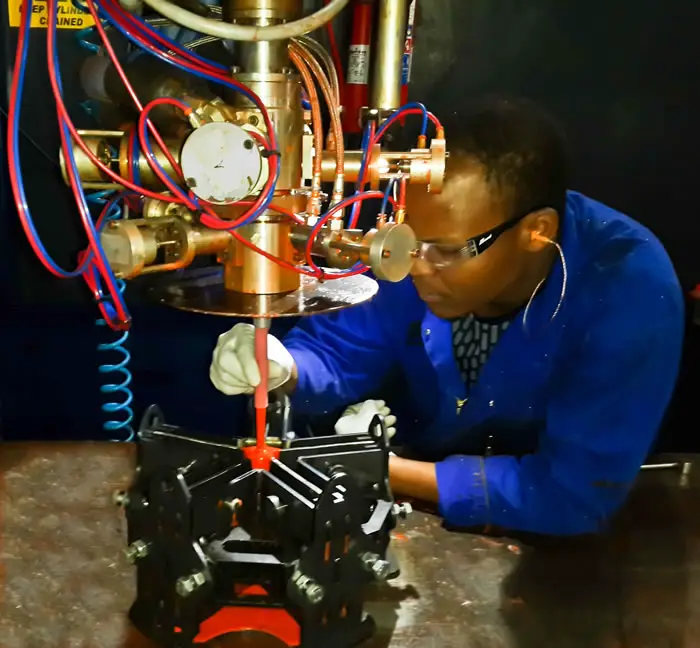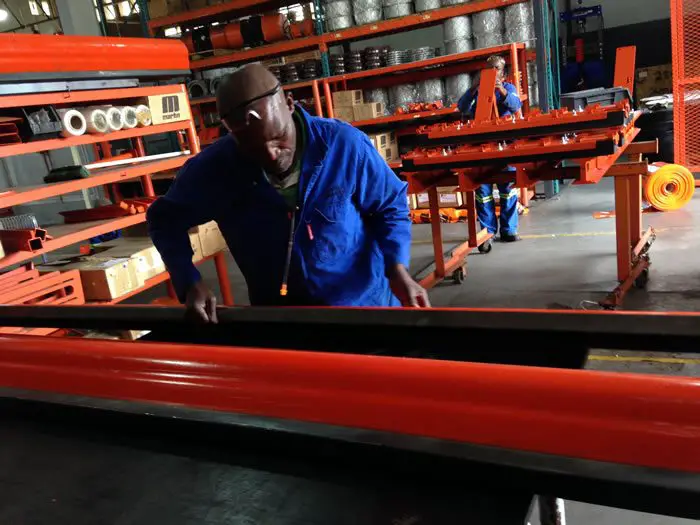In a move designed to deliver global product availability and consistency with the fastest possible response to customer orders, Martin Engineering has announced the design and manufacture of a custom molding cell for its polyurethane conveyor belt cleaners. By mixing, forming and curing its own designs in the modular work station — rather than subcontracting the production as most suppliers do — the company is taking complete control of the entire process, allowing one-day turnaround on most orders and even same-day shipping in many cases. As a result, customers from any region in the world can benefit from rapid deployment of belt cleaners meeting the highest standards for quality control.

colored urethane with the forming and curing process.
“We’re one of the few manufacturers that designs and molds its own belt cleaner blades,” explained Global Engineering Manager Paul Harrison. “We’ve been manufacturing them in the U.S. for many years. With this modular work cell, we now have the ability to replicate the same manufacturing process in any of our business units, ensuring that we provide consistently high-quality products and quick delivery times virtually anywhere in the world.” The work cell combines all the elements necessary to generate mixed, colored urethane with the forming and curing process that is specific to Martin Engineering products.
Harrison explained that by custom-engineering the process from the ground up, the design group was able to solve many of the problems inherent to urethane molding in other regions of the world. “The work cell is voltage- and frequency-independent,” he said. “It will function effectively whether the power source is in the U.S., South Africa, China or the UK.”
Further, the new process features a universal power supply that will store enough energy to prevent a total shutdown in the event of a brown-out or temporary power interruption. In the past, a power interruption would cause materials in the mixing head (the nozzle that pours liquid urethane into the mold) to gel, and it required a large investment in manpower to clean the urethane out. This process includes emergency procedures that allow the equipment to function long enough for operators to extract the material and shut down, helping to prevent extended periods of downtime for maintenance.
In order to accommodate the varying skill levels around the world, Harrison and his team designed-in monitoring for all essential steps to relieve operators of the need for manual tracking. The pressures, power availability and quality, temperatures, speeds and many other parameters are all monitored continuously, and the system can even be diagnosed and controlled remotely.
In addition to the equipment advancements, Martin Engineering negotiated a global supply agreement to assure worldwide material consistency, quality and availability.
The prototype molding center has been disassembled and shipped to the Martin Engineering South Africa facility in eMahlahleni (Witbank), where it has been operating successfully for three months. “South Africa was one of the few business units that subcontracted the molding process,” he continued. “So it made sense for us to establish the first unit there in response to increasing customer demands.”
Operators of the new work cell have the ability to mold straight cleaners, segmented designs and long blades that can be cut to length. By stocking the appropriate profiles in longer lengths, conveyor owners can replace worn blades by simply cutting to the required size, which can help reduce inventory of replacement belt cleaners.
Martin Engineering is one of the original and largest manufacturers of conveyor belt cleaners in the world, responsible for many of the innovations that have appeared in belt cleaning over the last 30 years. The company offers a broad range of different urethane formulations designed for specific materials and conditions, which helps extend service life. Products are available in a wide array of shapes, sizes and materials, designed with the firm’s patented Constant-Area Radial Pressure (CARP) technology to deliver consistent cleaning throughout all stages of blade life. Unlike most competing designs, the innovative engineered cleaners maintain the same
contact area, blade angle and pressure throughout their service life to effectively remove virtually any type of material carryback, even as the blade wears down over time. With 10-20% more urethane on average in each blade than competing blade designs, Martin Replacement Blades are engineered to deliver improved durability and lower cost of ownership.
Founded in 1944, Martin Engineering has grown to be the world leader in bulk materials handling technology. Beginning with its flagship ball vibrator design, the company has been a continuous innovator of products and services to deliver cleaner, safer and more productive bulk material processing in applications such as coal handling, mining, cement, aggregates, biomass, grain and other channels. Headquartered in Neponset, IL, the company offers manufacturing, sales and service from factory-owned business units in Brazil, China, France, Germany, Indonesia, Mexico, South Africa, Turkey, India and the UK, and under exclusive license with ESS Australia.

